|
Algeria
Angola
Benin
Botswana
Burkina Faso
Burundi
Cameroon
Cape Verde
Central Afr. Rep.
Chad
Comoros
Congo (Brazzaville)
Congo (Kinshasa)
C�te d'Ivoire
Djibouti
Egypt
Equatorial Guinea
Eritrea
Ethiopia
Gabon
Gambia
Ghana
Guinea
Guinea-Bissau
Kenya
Lesotho
Liberia
Libya
Madagascar
Malawi
Mali
Mauritania
Mauritius
Morocco
Mozambique
Namibia
Niger
Nigeria
Rwanda
São Tomé
Senegal
Seychelles
Sierra Leone
Somalia
South Africa
South Sudan
Sudan
Swaziland
Tanzania
Togo
Tunisia
Uganda
Western Sahara
Zambia
Zimbabwe
|
Get AfricaFocus Bulletin by e-mail!
Format for print or mobile
Namibia/Africa: Afrobarometer Insights
AfricaFocus Bulletin
May 21, 2018 (180521)
(Reposted from sources cited below)
Editor's Note
In Namibia in 2014, the ruling SWAPO party decided to adopt a 50-50 gender quota for
its representatives in the National Assembly. This brought the representation of
women in the National Assembly to 41% in the election that year (more than twice the
current 19% of women in the U.S. House of Representatives). Recent survey
results show that the move has proved highly popular in Namibia, with 71% of women
and 68% of men saying that such a quota should be mandated for all political parties.
Such detailed insights into public opinion are now available for over 30 African
countries, due largely to the work of Afrobarometer, a continent-wide network which
conducts professional surveys with local partners and is now reporting its results
from its 7th round of surveys since 1999.
Analyses of results from the November 2017 survey are now being released by the
Institute for Public Policy Research in Windhoek, Namibia. Like Afrobarometer surveys
in other countries, they provide a valuable antidote to over-generalization and
stereotypes, whether nefarious or simply uninformed, about "Africans" or indeed
"all" people in any country in Africa or anywhere in the world.
I have often made reference to Afrobarometer surveys in AfricaFocus (see
http://tinyurl.com/y9xrnscx for previous Bulletins making use of Afrobarometer).
Today's Bulletin focuses on Namibia, both because it is a country that rarely
features in international news other than for tourist travel, and because of notable
findings such as on the leading role the country is taking on women's rights to
political leadership. AfricaFocus readers may laugh at President Trump's invention
of a country called "Nambia" last year (see coverage in Washington Post at
http://tinyurl.com/yacr7lg6). But all of us non-Namibians can benefit from more
nuanced understanding of Namibia.
More generally, Afrobarometer deserves much wider attention from scholars,
journalists, and anyone interested in substituting nuanced analysis for stereotypes.
Increasingly global polling firms also include African countries, with surveys in
local languages and sophisticated methodology. But Afrobarometer has pioneered in
doing this. And, while commercial firms do not allow access to the public for closer
analysis of the data, Afrobarometer provides a flexible and user-friendly on-line
tool for doing so, while protecting individual privacy. At the end of this Bulletin I
show a few tables and graphs generated with their on-line data analysis tool.
In addition to gender, other topics addressed in the excerpts below include the
negotiations with Germany for reparations for the early 20th century genocide of the
Herero and Nama, and the state of Namibia's economy and democracy. The next presentation,
on May 22 in Windhoek, will focus on service delivery in rural and urban areas.
For previous AfricaFocus Bulletins on Namibia, visit
http://www.africafocus.org/country/namibia.php
+++++++++++++++++++++++++++
AfricaFocus Resources for Making the Road Travel Seminars
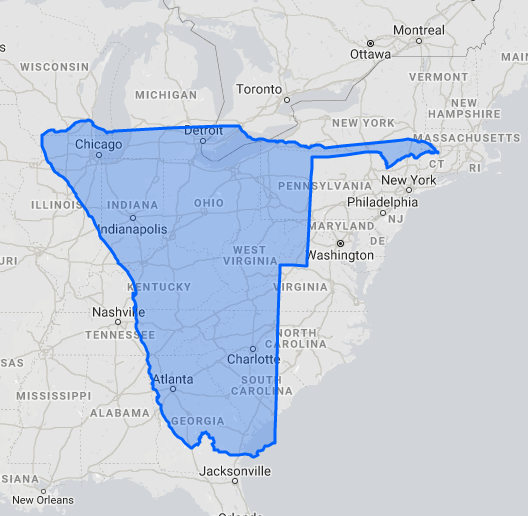
An additional reason for the focus on Namibia this week is work AfricaFocus is doing
with the Making the Road travel seminars to Southern Africa and Cuba
(http://makingtheroad.com), and in particular the group going to South Africa and
Namibia this summer. In 2016 and 2017 I began working with my long-time friend and
colleague Prexy Nesbitt to help out with some tasks, which have included preparing
resource guides for participants, including links to recent articles, videos, and
maps, to supplement their dialogues on the ground with social-justice activists and
liberation movement veterans.
Now we have decided to make these resource guides available to a wider audience on
the web. They are designed not as academic resources or for specialists, but as aides
in introducing background and issues relating to each country visited, highlighting
recent and accessible information.
Check them out at http://www.africafocus.org/mtr-resources/intro-resources.php
Just published, in coordination with work on today's Bulletin, is a short resource
guide on Namibia (https://tinyurl.com/MTR-Namibia).
The comparative map to the right, generated through http://thetruesize.com,
available in larger size in the resource guide, illustrates the relative size of Namibia and the United States.
Another short resource prepared for Making the Road, on
Southern Africa: Many Countries, Intersecting Histories, includes several
similar maps and short background text explaining how "Southern Africa" is more than
"South Africa."
++++++++++++++++++++++end editor's note+++++++++++++++++
|
Gender quotas, GBV, German reparations, Koevoet, and other topics
Findings from Afrobarometer Round 7 survey in Namibia
IPPR Presentation, 12 April 2018, Windhoek, Namibia
Afrobarometer http://www.afrobarometer.org Institute for Public Policy Research
http://ippr.org.na Institute for Justice and Reconciliation https://www.ijr.org.za/
The Afrobarometer team in Namibia, led by the Institute for Public Policy Research
and Survey Warehouse, interviewed 1,200 adult Namibians in November 2017. A sample of
this size yields country-level results with a margin of error of +/-3% at a 95%
confidence level. Previous surveys have been conducted in Namibia in 1999, 2002,
2003, 2006, 2008, 2012, and 2014.
[Excerpts only: full presentation available at http://tinyurl.com/y9onqvjv]
At a glance
- Gender equality: Most Namibians say a gender quota system should be adopted for
regional council elections. More than half say the National Assembly has been more
effective with more women.
- Gender-based violence: Namibians see alcohol, unemployment, and poverty as major
contributors to the scourge of GBV in their country.
- Past and present: Most Namibians believe that government should work with Nama and
Herero traditional authorities on genocide reparations.
- Land matters: Many Namibians say that the Affirmative Repositioning Movement (AR)
has been most effective in getting government to pay attention to land issues.
- Taxes and budget: Almost three-quarters of citizens endorse the legitimacy of tax
officials, even though more than two-thirds say at least "some" tax officials are
corrupt.
What is Afrobarometer?
- A pan-African, non-partisan survey research project that measures citizen attitudes
on democracy and governance, the economy, civil society, and other topics.
- Started in 12 African countries in 1999, expanded to 36 countries in Round 6
(2014/2015). Round 7 surveys are being conducted in 2017/18.
- Goal: To give the public a voice in policymaking by providing high- quality public
opinion data to policymakers, policy advocates, civil society organizations,
academics, news media, donors and investors, and ordinary Africans.
- A national partner in each country conducts the survey. In Namibia, Afrobarometer
Round 7 survey was conducted by Survey Warehouse and the Institute for Public Policy
Research.
Methodology
- Nationally representative sample of adult citizens
* All respondents are randomly selected.
* Sample is distributed across regions/states/provinces and urban/rural areas in
proportion to their share in the national population.
* Every adult citizen has an equal chance of being selected.
- Face-to-face interviews in language of the respondent's choice.
- Standard questionnaire allows comparisons across countries and over time.
- Sample size in Namibia of 1,200 adult citizens yields a margin of error of +/-3% at
a 95% confidence level.
- Fieldwork for Round 7 in Namibia was conducted 5-27 November 2017.
Survey demographics - in %
* Gender: Men 49 , Women 51
* Residence : Urban 55 , Rural 45
* Education: No formal education 7, Primary 16, Secondary 53,
Post-secondary 22
* Religion: Christian 92, Other 8
Findings
Gender equality in Namibia - Key findings
- More than half of Namibians (59%) say that the increased number of women in the
National Assembly has made Parliament more effective.
- Moreover, seven in 10 Namibians (70%) say that all political parties should be
mandated to adopt a gender quota in the National Assembly.
- Although men and women differ on whether men make better leaders than women, on the
whole, most Namibians (68%) believe that women should have the same chance of being
elected to political office as men.
Gender-based violence - Key findings
- A majority of Namibians (84%) say it is never justified for a man to beat his wife.
- Most Namibians (71%) say alcohol abuse is the predominant factor that contributes
to GBV in the country.
- Despite daily reports of GBV in Namibia, most Namibians (71%) believe that the
government is handling the fight against GBV well.
Unresolved historical issues - Key findings
- More than half of Namibians (56%) say traditional authorities should join genocide
negotiations.
- However, only 48% say government is doing well on these negotiations.
- Two-thirds (66%) of Namibians say Germany should pay reparations.
Should Germany pay reparations?
* Agree/Strongly agree that Germany should pay reparations - 66%
* Disagree/Strongly disagree - 10%
* Neither agree nor disagree/Don't know/Refused - 24% Money issues
Tax and budget matters - Key findings
- Almost three-quarters (73%) of Namibians say tax officials always have the right to
make people pay taxes, even though more than two-thirds (69%) believe that at least
"some" tax officials are corrupt.
- About two-thirds (64%) of Namibians say that government should reduce the defense
budget.
- A slim majority (53%) believe government should raise taxes to fund povertyreduction
efforts.
Government not effective on land issues unless under pressure - Key findings
- A little more than half (52%) of Namibians say that government is not effective in
providing serviced land/housing in urban areas.
- A majority (56%) are of the opinion that the government's land resettlement program
is not effective.
- AR is perceived as most effective in getting government to pay attention to land
issues and also represents the most widely supported approach to land reform.
Who gets government to pay attention to land issues?
* The Affirmative Repositioning Movement or AR - 41%
* The Landless People's Movement or LPM - 12%
* Government is handling land issues well without external influence - 10%
* Opposition political parties - 8%
* The media - 7%
[Editor's note: AR (https://en.wikipedia.org/wiki/Affirmative_Repositioning) is a
youth movment focused on access to urban land. LPM was founded by former govenment
officials and is planning to become a political party.]
Namibians want gender quotas extended to regional councils
News release
Institute for Public Policy Research
Windhoek, Namibia
12 April 2018
[Excerpts. For full set of figures, see original news release at
http://tinyurl.com/ydb3p645]
More than half of Namibians think that the increased number of women in the National
Assembly has made Parliament more effective, according to the most recent
Afrobarometer survey.
Moreover, more than two-thirds of Namibians support the use of gender quotas to
ensure more equal participation of men and women in both National Assembly and
regional council elections.
In 2015, Namibia leapfrogged many countries to become a global leader in the
representation of women in the National Assembly after the ruling SWAPO party
implemented a 50/50 party list. However, regional councils and the National Council
continue to be dominated by men. With the next set of elections taking place in 2019
and 2020, and given the government's stated commitment to gender equality, gauging
public support for quota systems, as well as perceptions of the impact on the
National Assembly of the increased number of women, is timely.
Key findings
- A majority (59%) of Namibians say that having more women in the National Assembly
has made that body more effective (Figure 1).
- More than two-thirds (70%) of Namibians, regardless of gender, say that all
political parties should be mandated to adopt a gender quota to ensure 50/50
representation of men and women in the National Assembly (Figure 2).
- The same majority (70%) say the gender quota system should be extended to the
regional councils (Figure 3).
Most Namibians (68%) believe that women should have the same chance as men of being
elected to political office (Figure 4).
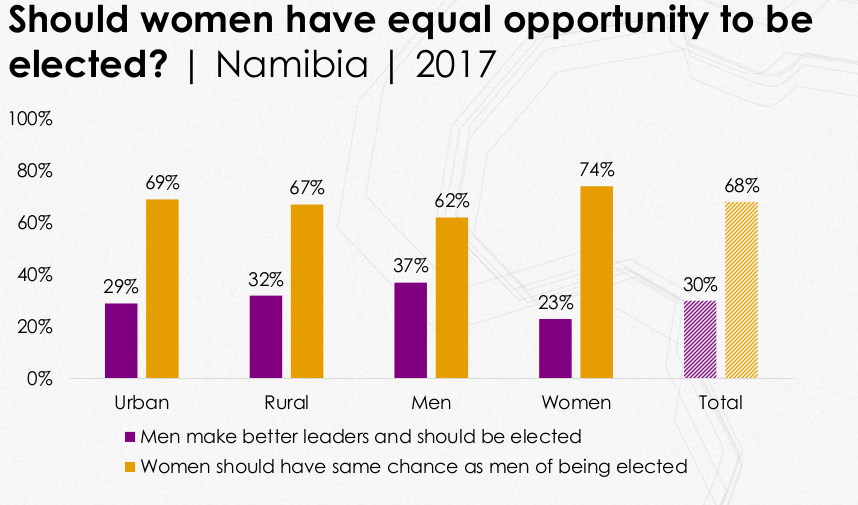
Respondents were asked: Which of the following statements is closest to your view?
Statement 1: Men make better political leaders than women, and should be elected
rather than women. Statement 2: Women should have the same chance of being elected to
political office as men. (% who "agree" or "agree very strongly" with each
statement).
Majority of Namibians say traditional authorities should join negotiations on
genocide reparations
Institute for Public Policy Research
Windhoek, Namibia
News Release 12 April 2018
[Excerpts. For full set of figures, see original news release at
http://tinyurl.com/y9ljws7f]
Most Namibians say traditional authority representatives should participate in -
if not lead - genocide negotiations with the German government, according to a new
Afrobarometer survey. Only one in five citizens say the Namibian government should
handle the negotiations on its own.
Key findings
- A majority (56%) of Namibians say genocide reparations negotiations should be
handled by both government and traditional authorities. An addition 11% say Herero
and Nama traditional authorities should conduct the negotiations themselves (Figure
1).
- Almost half of Namibians (48%) think government is handling reparations
negotiations with the German government "very well" or "fairly well" (Figure 2).
- Two-thirds (66%) of Namibians say Germany should pay reparations for the genocide;
only one in 10 Namibians (10%) disagree (Figure 3).
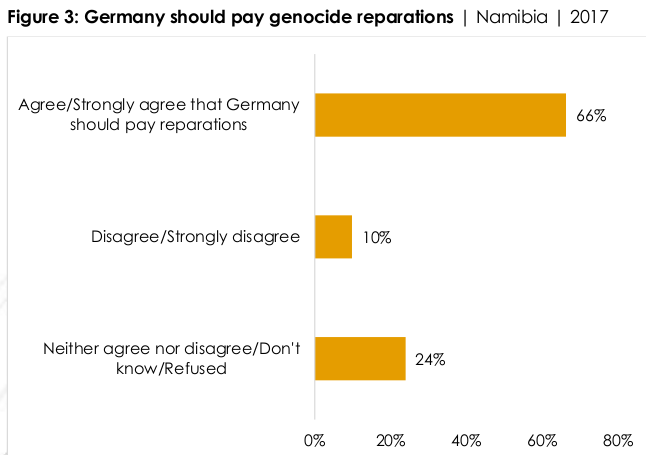
Respondents were asked: For each of the following statements, please tell me whether
you disagree or agree: The German government should pay reparations to Namibia for
the crimes of genocide committed against the Namibian people?
Views of Namibia's economy darken sharply; youth more likely to consider emigration
Afrobarometer Dispatch No. 202, 1 May 2018
Maximilian Weylandt
[Excerpts. For full set of figures, see original dispatch at
http://tinyurl.com/y8du924y]
Summary
In the past two years, Namibia's economy has struggled. In 2016, the country saw two
consecutive quarters of negative gross domestic product (GDP) growth, officially
plunging it into a depression, followed by the first year since 1993 to record a
decline in the GDP, by 0.8% in 2017 (Namibia Statistics Agency, 2018). At the same
time, unemployment among youth, who make up almost 40% of the population, increased
to 43.4% in 2016, up from 39.2% in 2014 (Namibia Statistics Agency, 2015, 2017).
Citizens' perceptions tell a similar story: According to the most recent
Afrobarometer survey, the share of Namibians who think the economy is doing poorly is
at a historic high, triple the proportion in 2014, and almost two-thirds say the
government is doing a bad job of managing the economy. Yet more than half describe
their personal living conditions as good, and a majority expect things to get better
over the coming year.
Even though youth tend to rate their own living conditions more favourably than their
older counterparts, they are particularly critical of the government's economic
management.
They are also more likely than their elders to be thinking about moving to another
country. Economic considerations feature heavily in these thoughts: By far the most
common reason for considering emigration is to find work.
Key findings
- The share of Namibians who rate the country's economic condition as "fairly good"
or "very good" has dropped from 74% in 2014 to 41%.
- About half (52%) of Namibians describe their personal living conditions as "fairly
good" or "very good."
- Youth are somewhat more likely than their elders to see their living conditions as
good (55% vs. 48%), but they are less likely to approve of the government's
performance on the economy (31% vs. 40%).
- One in five Namibians (22%) have given at least "a little" thought to emigrating.
Youth are more likely than their elders to think about moving to another country (27%
vs. 17%). Namibians' reasons for considering emigration are predominantly tied to
economic issues.
Dramatic downturn in views on Namibia's economic condition
Since the second round of the Afrobarometer survey in Namibia in 2003, respondents
have been asked how they would describe "the present economic condition of this
country." In the preceding five rounds, Namibians who thought the state of the
economy was "fairly good" or "very good" always far outnumbered those who considered
it "fairly bad" or "very bad."
As of November 2017, however, negative assessments of the economy stand at a record
high, tied at 41% with positive evaluations (Figure 1). Compared to the 2014 survey,
the proportion of citizens who describe the economy as "fairly bad" or "very bad" has
almost tripled, while the share who say it is fairly/very good has dropped by 33
percentage points. This pattern holds across key demographic groups, with little
difference by gender, age, area of residence, or educational level (Figure 2).
A slight majority (52%) of Namibians consider their own living conditions "fairly
good" or "very good" - a decrease from 60% in the 2014 survey (Figure 3). The share
of Namibians who rate their living conditions as "fairly bad" or "very bad" has
increased by 10 percentage points since the previous survey.
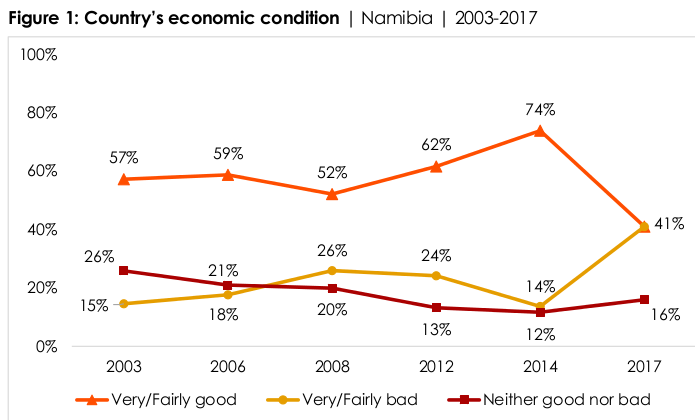
Respondents were asked: In general, how would you describe the present economic
condition of this country?
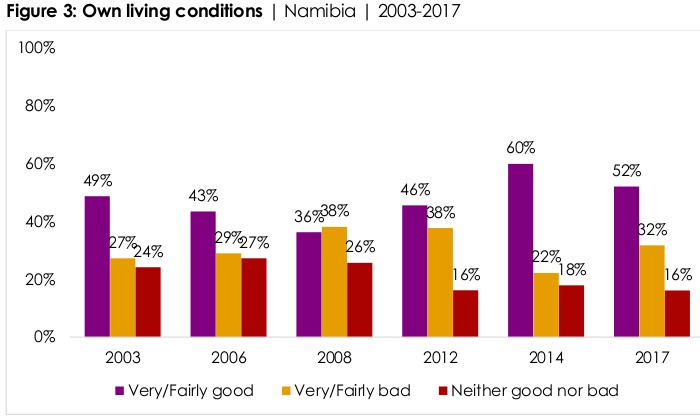
Respondents were asked: In general, how would you describe your own present living
conditions?
Exploring Afrobarometer On-Line
For anyone interested in getting behind the headlines to understand recent
developments in African countries in the 21st century, Afrobarometer is an
indispensable source. Surveys are only one window into reality, of course, but they
provide rich data that both help unpack stereotypes and provoke questions needing indepth
exploration through other sources as well.
For readers to make their own judgments, Afrobarometer provides full questionnaires
and explanations of survey methodology for each country included over the seven
rounds of surveys since 1999. The results sampled above from Namibia are from the
most recent survey round from 2016/2018. The data from Namibia for that round is not
yet available in the Online Data Analysis tool
(http://afrobarometer.org/online-data-analysis/), which now has the latest data from 8
of the more 36 countries available from the previous round in 2014/2015.
The tool is extremely flexible and not difficult to use, although it includes many
option for creating tables and charts and for downloading raw data as well as results
in different formats.
Here are a few of the charts and tables I created from the Round 6 Namibia data, with
one from South Africa for comparison. Note that these are not from the current
Round 7 results reported above.
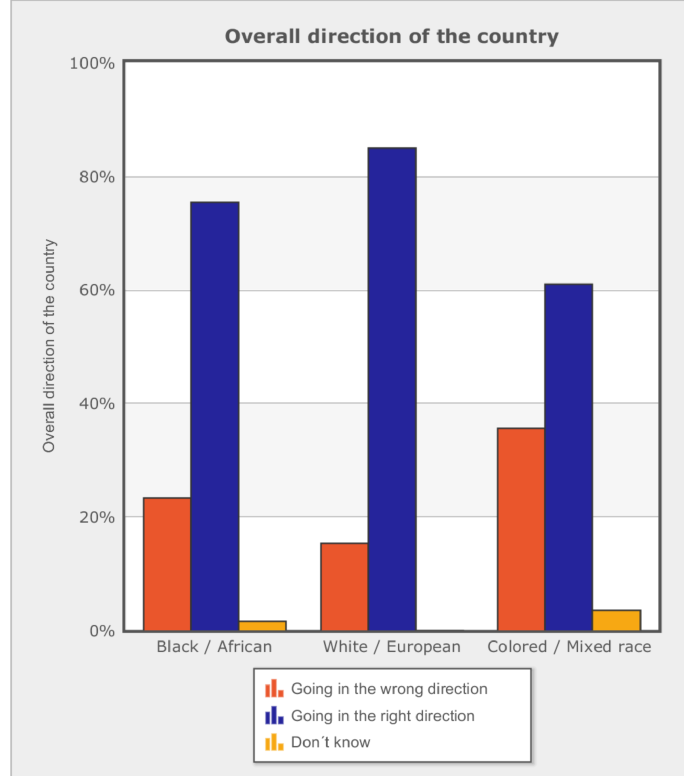
This breakdown by race shows that a majority of Namibians of all races were
confident of the general direction the country was going, with close to 80% of
both black and white Namibians giving positive ratings.
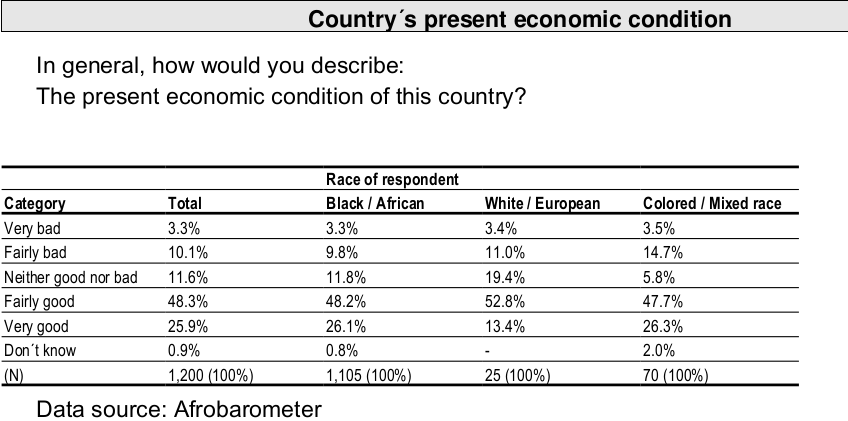
The percentage of favorable ratings for the current state of the economy in Namibia
were slightly less positive, but still added up to over 70% for those saying
either "fairly good" or "very good." [As noted in the IPPR report above, this
had dropped sharply by the 2017 survey.]
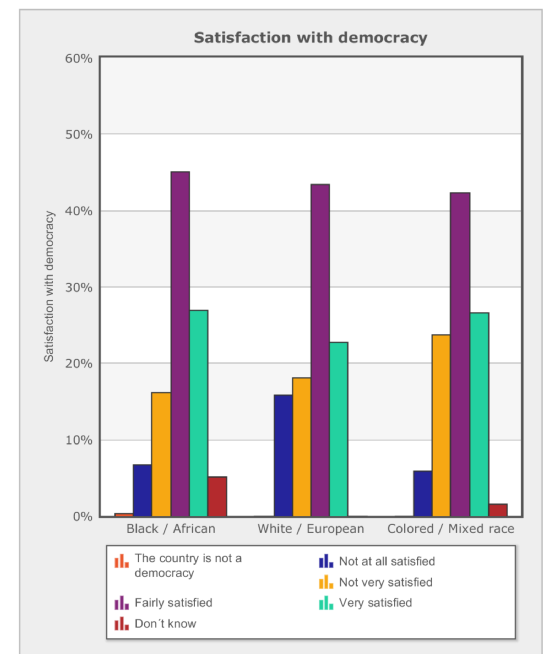
The combined totals for satisfaction with democracy ("fairly satisfied" or
"very satisfied" also came to 60% or over in all racial groups in Namibia. This contrasted
with public opinion ratings of satisfaction with democracy in neighboring
South Africa (chart below), which were both lower and showed significant
variation by racial groups.
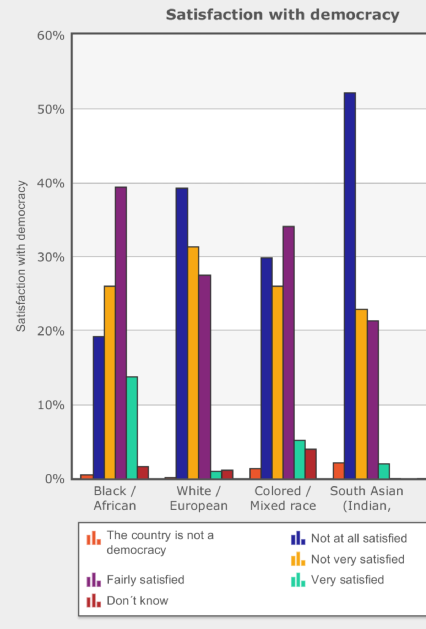
The snippets of data above are, of course, only teasers. But they show the
potential richness of data available on-line, for more in-depth analyses
by scholars knowledgeable about Namibia or for exploration by teachers,
students, journalists, policy makers, or other analysts.
AfricaFocus Bulletin is an independent electronic publication providing reposted
commentary and analysis on African issues, with a particular focus on U.S. and
international policies. AfricaFocus Bulletin is edited by William Minter.
AfricaFocus Bulletin can be reached at [email protected]. Please write to this
address to suggest material for inclusion. For more information about reposted
material, please contact directly the original source mentioned. For a full archive
and other resources, see http://www.africafocus.org
|
